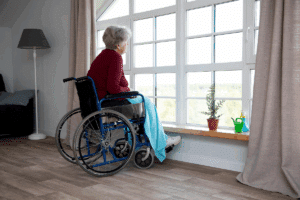California Nursing Home Residents’ Rights Under the Elder Abuse Act
Older and dependent adults are especially vulnerable to mistreatment in long-term care facilities. To protect these individuals, California enacted the Elder Abuse and Dependent Adult Civil Protection Act (EADACPA). This law provides residents with safeguards against abuse and gives them the right to take legal action when harm occurs.
At Cutter Law, our nursing home abuse attorneys explain how the Elder Abuse Act works in California and how it can help you or your loved one seek justice.
- Under the Elder Abuse Act, elderly and dependent adults in California nursing homes have rights and protections against abuse.
- The Elder Abuse Act sets mandatory reporting for abuse and encourages victims to come forward without fear of punishment.
- Nursing home abuse victims can seek legal remedies, including compensatory damages, punitive damages, and compensation for attorney’s fees.
- An experienced nursing home attorney can help families take legal action when a person’s Elder Abuse Act rights are violated.
What Is the Elder Abuse Act in California?
The Elder Abuse and Dependent Adult Civil Protection Act, or California Elder Abuse Act, is a law enacted in 1982 that protects older or dependent adults from different forms of abuse, neglect, and abandonment. The act applies to adults who are 65 years of age or older, adults 18 to 64 years old who are living with physical disabilities or mental limitations, and adults admitted as inpatients to a 24-hour health care facility.
Specifically, the Elder Abuse Act was drafted to prevent dangerous conditions or inappropriate acts and enforce penalties for common types of abuse and neglect, such as:
- Physical abuse
- Emotional abuse
- Financial abuse
- Sexual abuse
- Neglect or isolation
- Abandonment or abduction
Under the Elder Abuse Act, victims who pursue a civil case may be able to recover attorney’s fees, court costs, and, in certain cases, punitive damages. These enhanced remedies are designed to encourage victims and their attorneys to hold negligent caregivers and facilities accountable.
Rights of Nursing Home Residents Under the Elder Abuse Act
No matter what nursing home you choose for your loved one, your family must understand the protections granted by the Elder Abuse Act to promote a safe living environment. These rights extend to residents of nursing homes and long-term medical facilities in California.
Protection From Physical and Emotional Abuse
Elderly people living in nursing homes have the right to be free from physical, mental, and emotional abuse, including:
- Hitting, pushing, and other physical force
- Verbal intimidation and yelling
- Medicinal or chemical restraints
- Involuntary seclusion from others
- Abuse of a sexual nature
Protection From Neglect
Elder neglect can include withholding essential care, failing to provide proper nourishment and hydration, or ignoring personal hygiene necessities. This type of neglect often leads to elderly patients falling, illnesses, infections, and bedsores in nursing homes. To prevent this, caretakers are required to meet the basic needs of nursing home residents, such as:
- Adequate food and water
- Safe shelter
- Clean clothing
- Personal hygiene
- Necessary medical care
Right to Be Treated With Dignity and Respect
Nursing home staff and caregivers must treat residents with respect and dignity, which means giving them appropriate autonomy and privacy. Examples of respectful treatment owed to elders include:
- Management of money
- and financial affairs
- Visitations from family members
- Access to advocates when requested
- Support in communication or transportation
- No discrimination based on race, disability, or other protected group
Right to Proper Medical and Mental Health Care
Nursing home residents also have the right to access proper care by a qualified medical professional. This includes being fully informed about their health status and taking part in their care plan. The right to proper medical care also involves:
- Receiving diagnoses in a language they understand
- Accessing medical records and reports promptly
- Choosing their own doctor or medical specialist
- Refusing to participate in experimental treatments
- Expressing complaints about the care they receive
Right to Report Abuse Without Fear
When residents or their family members want to report nursing home abuse, mistreatment, or neglect, they have the right to make complaints without fear of punishment. The nursing home is required to investigate and address the issue right away.
The Elder Abuse Act also includes details on mandatory reporting. Full-time caregivers and people who have intermittent responsibility for a dependent or elder adult are required to look for signs of nursing home abuse and report suspected incidents. Other mandatory reporters include doctors, nurses, therapists, and clergy members.
Legal Remedies Under California’s Elder Abuse Act
In addition to criminal penalties, the Elder Abuse Act allows victims to bring civil lawsuits for elder or dependent adult abuse. In these cases, plaintiffs must prove their claims by a preponderance of the evidence, meaning it is more likely than not that the defendant acted deliberately and caused harm, rather than meeting the higher criminal standard of beyond a reasonable doubt.
Nursing home abuse victims can bring a lawsuit to recover damages, including:
- Medical bills
- Cost of future medical care
- Other financial losses
- Pain and suffering
- Emotional distress
- Loss of quality of life
In some cases, victims can also claim punitive damages and attorney’s fees. However, these enhanced remedies are only available in cases of physical abuse, neglect, or abandonment. You must prove by clear and convincing evidence that the defendant is guilty of recklessness, oppression, fraud, or malice connected to the abuse.
Under California’s statute of limitations for elder abuse, victims have two years for physical abuse or four years for financial elder abuse to bring a legal claim for compensation.
Nursing Home Wrongful Death Damages
If the nursing home abuse resulted in wrongful death, the victim’s personal representative can bring a claim on their behalf. In addition to compensatory damages available in a nursing home wrongful death claim, enhanced remedies under the Elder Abuse Act include punitive damages, attorney’s fees, and pain and suffering the decedent experienced before death.
Working with a trusted nursing home abuse attorney can help your family navigate the complexities of these cases and demand full compensation for losses. Consult an experienced lawyer who can offer the support and guidance you need during this difficult time.
How To Report Nursing Home Abuse in California
If you or a loved one is experiencing abuse or neglect in a California nursing home, reporting mistreatment can provide you with protection and legal remedies. For immediate threats, call 911 to report abuse and remove yourself from the dangerous situation.
Next, contact your local Adult Protective Services (APS) office. Each California county has local APS contact information and a 24-hour hotline for dependent adult and elder abuse reporting.
Connect with the Long-Term Care Ombudsman Program in your area to report health and safety issues, including abuse and violations of rights. The statewide CRISISline number is 1-800-231-4024 or you can find local services in your county.
You can also contact the California Department of Public Health (CDPH) to report nursing home abuse and compromised care.
To summarize, make reports of nursing home abuse to:
Why Choose Cutter Law for Elder Abuse Cases
The California Elder Abuse and Dependent Adult Civil Protection Act provides vital protections for vulnerable adults in long-term care. At Cutter Law, we represent nursing home abuse victims and guide families through the legal steps needed to pursue justice. We understand how devastating it is to discover that a loved one has been mistreated, and our team is committed to holding negligent facilities and caregivers accountable.
Family-owned, California-based, and client-focused, Cutter Law will partner with you to protect your loved one’s rights. Contact us today for a free consultation.

“When you’re choosing an attorney to represent you in a nursing home abuse case, you really want to look for someone you trust, someone you believe has experience, is reliable, and someone you feel you can work well with. These cases can take months to years, so you want someone with whom you can have a good working relationship. It’s an intimate process—you spend a lot of time together, and sometimes, by the end of these cases, your clients end up being some of your best friends.”
– Margot Cutter

The elder abuse statute of limitations in California varies from two to four years, depending on the type of abuse, as injury and financial claims differ.

California law now gives sexual assault survivors extended or even unlimited time to file claims, with deadlines depending on the victim’s age, the date of the assault, and whether it involved childhood abuse or cover-up by others.

Yes, you can sue for emotional distress in California, and compensation may include both economic and non-economic damages depending on the severity of your distress.
